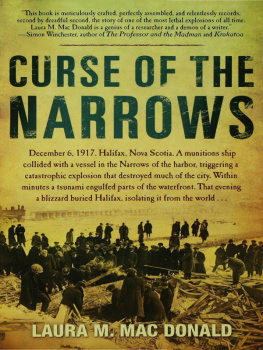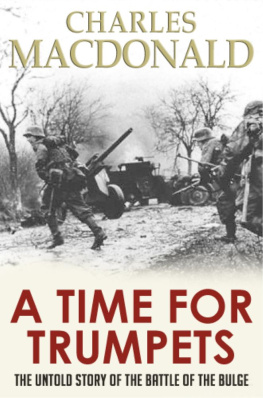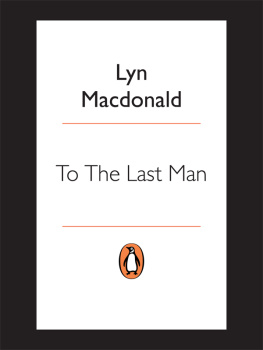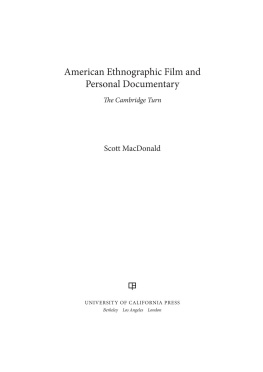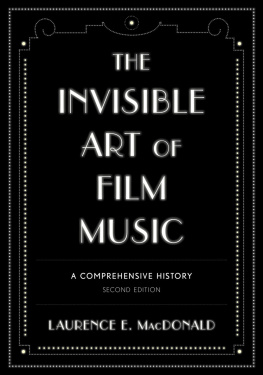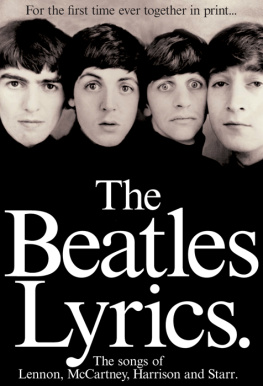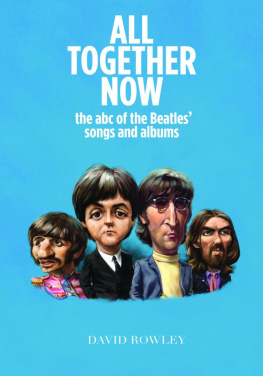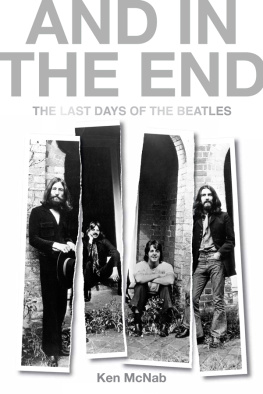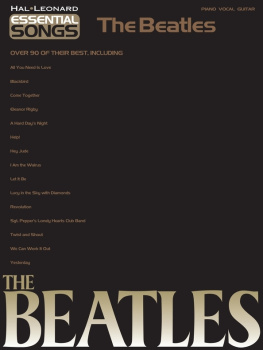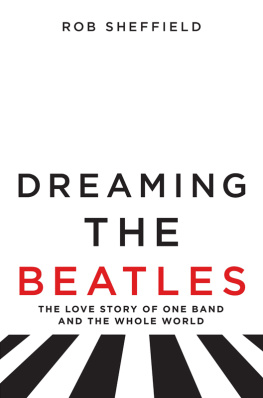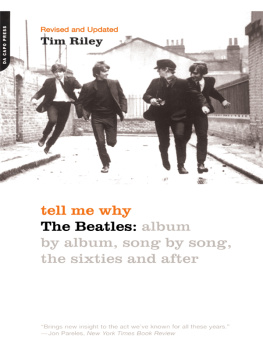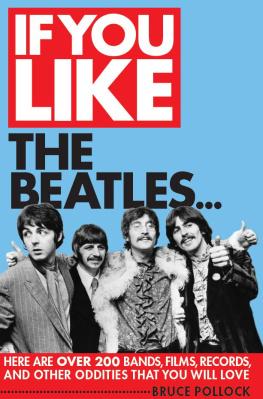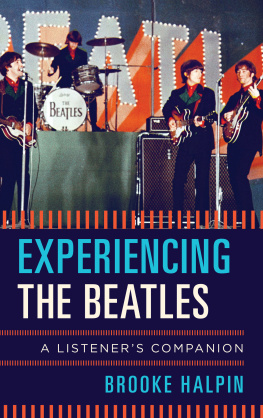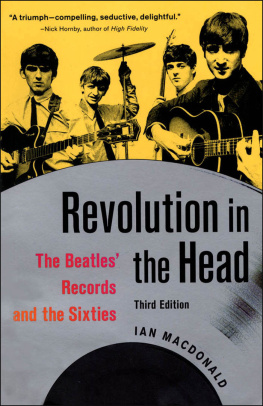Revolution in the Head
Revolution in the Head
Third Edition
The Beatles Records and the Sixties
IAN MACDONALD

Cover design: Monica Baziuk
Photo by Terry ONeill/Getty Images
Copyright The Estate of Ian MacDonald 1994, 1997, 2005
Published by arrangement with the authors estate.
This edition published in 2007 by
Chicago Review Press, Incorporated
814 North Franklin Street
Chicago, Illinois 60610
ISBN-13: 978-1-55652-733-3
ISBN-10: 1-55652-733-0
Printed in the United States of America
5 4 3
TO
SHE KNOWS WHO
PUBLISHERS NOTE
Revolution in the Head was first published in 1994 by Fourth Estate in the United Kingdom and Henry Holt in the United States. Fourth Estate published a fully revised and updated edition in 1997, which appeared in the United States in 1998 from Owl Books.
Before his death in August 2003, Ian MacDonald had prepared this third edition, which was published by Pimlico in the United Kingdom in 2005.
PREFACE TO THE SECOND REVISED EDITION
As the 21st century advances, no abatement of popular interest has yet occurred in The Beatles, a product of the 1960s. They always figure uniquely high in polls and voting lists, while books on every conceivable aspect of the group continue to pour out annually. This is the more remarkable in that, so far from great lyricists, they were reliant on a method of lyric-writing which, rather than aspire to through-composed verse forms in the traditional style, worked more as chains of phrases, some inspired, some hackneyed, others randomly surreal. If we were to ask average listeners what The Beatles lyrics mean, they would likely say very little. If, on the other hand, we asked the same listeners what The Beatles mean to them, we would get a very different response. Attached to the most original and imaginative popular music of the last fifty years, The Beatles lyrics enjoy a charmed existence in which their relative inconsequentiality is as nothing beside their association with joy, love, and freedom. An enormous amount is forgiven The Beatles as wordsmiths because of the sheer benignity of their idiom, its suffusion in loving feeling and (especially during the groups psychedelic years) its subversive carnivalism. Compared to the best of, say, the American singer-songwriters of the late 1960s and 1970s, the lyrics of The Beatles were wrought in a collage spirit, line by line. The group rarely thought of them as overall structures, still less as of any real emotional consequence ([86] ELEANOR RIGBY being an untypical example in The Beatles songbook of a sustained line of thought and expression amounting to a poem). They were, in short, instinctive, rather than rational, as artists - a trait which might be ascribed to their youth and social origin, but which owes most to the fact that they were working musicians rather than composers. All the great songwriting teams to have preceded them were, in that sense, composers rather than performers.
In early 20th-century popular music, composing teams almost invariably wrote for performers. Only a handful of performers ever wrote their own material before The Beatles and Bob Dylan appeared, neither of whom set out on their careers with the explicit intention of supplying themselves with their own songs. Dylan had little idea when he started writing songs that this would become his life; similarly, The Beatles started writing songs chiefly as a means of preventing other groups from stealing their own purloined material. They discovered that they had a powerful musical gift when Lennon and McCartney began to work one on one, eyeball to eyeball in 1963. Steered by their instant harmonising, the duos way of composing produced unusual moves that released a flood of catchy melody to which they sang dummy words or pure nonsense. Only later, generally speaking, did they fill in their lyrics - and then mainly phrasally, only bothering about overall concepts in formula terms (e.g., using the second or third person, aiming towards a sort of punch-line, and so on). Rather than tell a story in traditional Tin Pan Alley style, Lennon and McCartney wrote their lyrics to create a mood or a tone, so as not to get in the way of the effect created by the music and the sound. This bred a casual attitude to normal sense which later turned explicitly free-associational. There was always just enough sense in a Beatles lyric for the listener to get the general idea. The rest came from the sum of the parts of the record as a whole. The Beatles rarely thought long about their lyrics.
The Beatles casual lyrics look slipshod beside the careful verses and refrains of the great composers of popular song before them. Those raised on more traditional standards will listen to late-period Beatle songs and quite legitimately ask but what do they mean? To reply that they mean something more general than traditional lyrics, that they were conceived as records not songs, may or may not explain much. To those who grew up with The Beatles (and those who came after them, whose popular music is fundamentally cast in The Beatles image), it makes sense to say that the groups lyrics work as general signifiers, the message blending into a newly charged medium rather than composing itself into a coherent whole, detachable as verse. As verse, little of The Beatles word-output coheres, except by way of mood and style. Is this a serious criticism of their work? Yes. Nevertheless, it continues to be enormously popular - and, in the general terms proposed, quite rightly so. All that can ultimately be said about this aspect of The Beatles output is that it need not have been so; that they could have written lyrics in a more traditional style but that this would have made their songs and records very different from the way they are and, perhaps, far less alive with overall spontaneity. After all, no traditional lyricist could compose music like The Beatles. The comparative vagueness of their lyrics is the price we pay for their main inspiration: their musical originality.
This is not to say that there wont come a time when future listeners will look back on The Beatles and find them lyrically wanting, if not incomprehensible. In a century from now, the lingering aura of The Beatles will presumably have dispersed enough for the groups work to be looked at more objectively than we are capable of doing less than fifty years after them. Perhaps then the haphazard nature of many of The Beatles lyrics will be less easy to overlook and The Beatles nonchalant stories of how these lyrics came to fall into place will have lost their excusing charm. Or perhaps their music will continue to preserve them in a sort of protective aspic. For the fact is that The Beatles way of doing things changed the way things were done and, in so doing, changed the way we expect things to be done. That the future is partly a consequence of the existence of The Beatles is a measure of their importance.
Speaking of which, the most important thing to have happened in connection with The Beatles since this book was last revised in 1997 is the death of George Harrison on 29th November 2001. Of the songwriting Beatles, Harrison was the one with the most coherent belief system and the one most likely to think his lyrics through. This makes his lyrics perhaps more dogged than Lennon and McCartneys, but at least the listeners of the future have more chance of working out what he was driving at. Arguably more responsible than any other individual for popularising Oriental, and particularly Hindu, thought in the West, Harrison was a countercultural figure in his own right, albeit that his natural modesty would not have allowed him to relish the accolade. Most of his work from [105] WITHIN YOU WITHOUT YOU on
Next page


